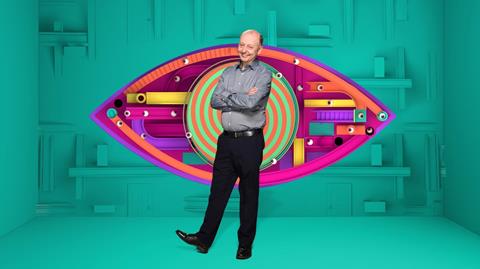Richard Storry’s gracious responses to hatred and his willingness to turn the other cheek intrigued viewers and housemates alike. It shows how Christian values can triumph even in reality TV’s most challenging environment, says Sophie Sanders

When you think of reality TV stars, they’re not typically slipper-wearing sexagenarians who combine writing fantasy novels with composing classical music and reading their Bibles. But Richard Storry, is all of those things – and he just won Big Brother.
In fact, in an interview with Glamour magazine before the series started, Storry acknowledged that he wasn’t the type of person typically popular with voters, saying: “I would have thought most people who watch this show are at the younger end of things and going to identify more closely with the younger housemates…but you just never know – it would be quite a coup if I did carry it off.”
And boy, was it a coup…
Loved and loathed
While he won an impressive 39 per cent of the viewer votes, he was something of a Marmite contestant, loved by some and loathed by others. Time and time again, his on-screen nemesis, Caroline Monk, hit below the belt saying he was “boring as f***” because he didn’t want to eat pizza (episode 27), “not funny” (exit interview), and, perhaps most controversially, the “antichrist” (episode 36).
@bbuk Protect Richard at all costs 🥹 #BBUK #realitytv #adoptionstory ♬ original sound - Big Brother UK
His ability to turn the other cheek after each of those blows was quite remarkable; he chose to respond to her hatred with humour – normally at his own expense - and even said he believed there was a “lovely person” inside the tough exterior (episode 32). Or, perhaps, he was just in denial. His claim that he and Caroline were “enemies on stage but mates in the dressing room” certainly doesn’t match her account of their relationship.
Most deserved winner
But other housemates and viewers warmed to Richard’s eccentricities and ability to see the good in all situations. There was an outpouring of love when he shared the heartwarming story of how he adopted his son, Khen, a refugee from Myanmar, despite being single his whole life. He was described on Reddit, Facebook, and TikTok feeds as the “most deserving winner” with one of the “most beautiful stories” in the history of Big Brother – a testament to power of being the good-willed underdog.
The look of a man who was not meant to be a housemate, bullied everyday by Caroline, always wearing normal day clothes and took himself to bed every night to read his bible who has just won big brother and realised how much the nation love him. Richard my king #BBUK pic.twitter.com/X8dIdUrAwO
— Alex (@alexr_241) November 14, 2025
What’s more, housemates Tate and Emily revealed in a couch conversation that they had been asking Richard lots of questions about his beliefs, leaping to his defence when Caroline said he “read the Bible because he has no life” (episode 27).
Put simply, it seems that Richard’s faith was central to his success. His unexpected, gracious responses were intriguing to viewers and housemates alike – they couldn’t fully understand him, but they wanted good to triumph and to understand what made him tick. Some started to join the dots, others had not yet made the connection, but it’s clear that his faith in Jesus shaped the way he acted and interacted.
The magnetism of faith
Yet Richard wasn’t universally popular - also because of his faith. This is in line with what Jesus told his disciples as he prepared to go to the cross: “If the world hates you, know that it hated me before it hated you” (John 15:18). Richard’s popularity and unpopularity stemmed from his faith – and that’s how a Christian just won Big Brother.
Whether or not you voted for Richard, preacher Charles Spurgeon’s reflections on the magnetism of faith are a challenge for us all. He said: “Jesus Christ is the great attractive magnet, and all must begin and end with him”.
As you look at your own life, are you drawing people to Jesus through your actions and interactions? Like Richard, do you handle criticism with dignity and meet hatred with love? Because every gracious response, every kind action, and every way in which you bring your faith into everyday life is an opportunity to draw others to Jesus. In the words of Spurgeon: “may the Lord make us all magnets for himself.”






































No comments yet